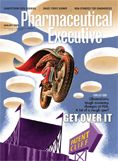Deal With It
Pharmaceutical Executive
When life gives them lemons, leaders roll up their sleeves and find a lemon distributor
Months into the global financial crisis, the world continues to dedicate vast amounts of energy to worrying. Government officials issue lengthy statements to calm the markets; accountants spin their earnings reports; pundits yell more loudly than ever; and traders buy and sell at breakneck speeds.

Sander A. Flaum
Business leaders are also caught in the turmoil. We might wring our hands over the stock market and calculate hourly the amount of wealth lost. We might focus on making ourselves look better in front of our Boards, riding the classic "herd instinct" by cutting jobs and trimming expenses. Or we could fret over how the downturn threatens our firms in the months to come: no bonuses, no options, just doom and gloom as the credit crisis worsens. We can do all of these things—or we can run our businesses.
Granted, the crisis is bad—and it's likely to get worse—but worrying and second-guessing will help neither you nor your company. Great leaders use their energy to the fullest during trying times. They hunt for ideas, track the flow of capital (tight as it may be), and seize new opportunities as they are presented.
Hitting the Spot
Through the years, recessions have been excellent laboratories for innovation. At the turn of the 20th century, John Moody began publishing his Manual of Industrial and Miscellaneous Securities, a compendium of market data for a wide array of industries. When the Panic of 1907 rocked the markets, Moody's company went under, but he'd taken away a valuable lesson about the importance of investor confidence and market analysis. In 1909, Moody began publishing again, but this time he rated the value of securities using a letter system derived from the early credit-reporting industry. Today, Moody's ratings are an invaluable tool in assessing a company's credit and stability.
Years later, during the Great Depression, Charles G. Guth took control of Pepsi-Cola, and used a creative strategy to steal market share from rival Coca-Cola. Guth surmised that an economic downturn would make value more important to consumers, so he began selling 12-oz. bottles of Pepsi for five cents apiece, the same price as Coke's 6-oz. bottles. He also took advantage of the popularity of radio with a new jingle:
Pepsi-Cola hits the spot
Twelve full ounces, that's a lot
Twice as much for a nickel, too
Pepsi-Cola is the drink for you.
In two years, Pepsi's profits more than doubled, and an early salvo had been fired in the Cola Wars.
IBM also gained ground during the Depression. Founder Thomas Watson, Sr. recognized that US industries would be unlikely to dedicate capital spending to new technologies, so IBM took its business to Europe, where sales soared. During the third quarter of 2008, as the economic downturn squeezed American businesses once again, IBM's Europe/Middle East/Africa division posted 10 percent revenue growth.
Scratching Around
Of course, it doesn't take an economic collapse to create tough conditions. Consider Frank Yuengling, former chief executive of a small Pennsylvania beer company named after his family. In 1919, Prohibition leveled the American beer industry, wiping out most of the nation's breweries. However, with Frank's guidance Yuengling survived by using the firm's vats to brew "near beer," and opening a dairy to sell ice cream. By creating new revenue streams, Yuengling remained in business until the 18th Amendment was repealed in 1933. Today, the company remains America's oldest brewery, and a favorite brand among Philadelphians.
More recently, my last class at Fordham came up with a Web site to teach unemployed MBAs how to seek opportunities during the slowdown. For example, since plumbers and electricians are now in greater demand (and pulling in about $80 an hour the last time I checked), the site suggests starting job-training companies for those positions. Other creative ideas included helping recently unemployed patients get their medications affordably without insurance coverage.
It's important to recognize that there's value in being tested. Henry Ford, one of America's most influential entrepreneurs, wrote, "Business is never so healthy as when, like a chicken, it must do a certain amount of scratching around for what it gets."
Sander A. Flaum is managing partner of Flaum Partners and chairman, Fordham Graduate School of Business, Leadership Forum. He can be reached at sflaum@flaumpartners.com
Reshema Kemps-Polanco: Taking Risks for Greater Reward
May 14th 2025Reshema Kemps-Polanco, executive VP and chief commercial officer, Novartis US, and the 2025 Healthcare Businesswomen’s Association Woman of the Year, uses the lessons she learned from her family to bring out the best in her teams.
